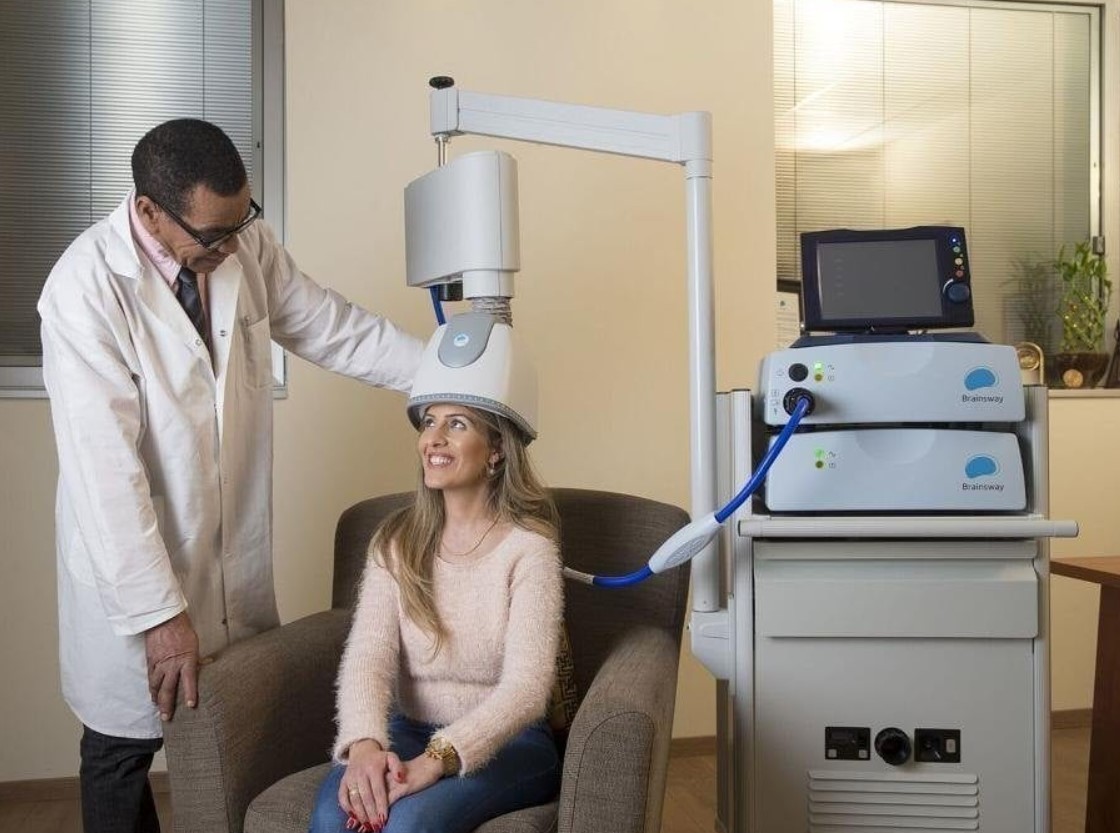Patient Perspectives: Real-World Outcomes with BrainsWay TMS Treatment

Navigating the complex world of mental health treatments can be daunting, but the emergence of advanced technologies like the BrainsWay TMS machine offers new hope for patients. Transcranial Magnetic Stimulation (TMS) is not a newcomer on the scene of psychiatric interventions; however, BrainsWay’s Deep TMS has revolutionized the approach with its patented technology. This article delves into the real-world outcomes experienced by patients who have undergone BrainsWay TMS treatment.
The BrainsWay TMS Difference
BrainsWay has pioneered the field of TMS with its deep TMS (dTMS) technology. Unlike traditional TMS, which stimulates neural activity up to 1.5 centimeters beneath the scalp, BrainsWay’s system reaches deeper into the brain, targeting areas up to 3.5 centimeters beneath the scalp. This deeper reach is a game-changer for patients with depression who have not found relief with other treatments.
Patient Journey to BrainsWay TMS
John’s Story: A New York Tale of Transformation
John, a 45-year-old New York resident, struggled with depression for over a decade. He tried various medications and therapies with little to no improvement. “It felt like I was in a constant fog, and no one could tell me how to get out,” he shares. His psychiatrist suggested BrainsWay Deep TMS as the next step, and John decided to give it a chance.
The Treatment Experience
The BrainsWay TMS machine is a non-invasive device that resembles a comfortable reclining chair with a helmet-like attachment. Patients sit back while the helmet delivers magnetic pulses to specific brain regions associated with mood regulation. “I was skeptical at first, given all the treatments I’d tried, but the process was painless, and the staff made me feel at ease,” John recalls.
Outcomes and Efficacy
After a few weeks of regular BrainsWay TMS sessions, John noticed subtle changes. “It wasn’t overnight, but one morning I woke up feeling lighter,” he says. Clinical studies support John’s experience, showing that BrainsWay Deep TMS can lead to a significant reduction in depressive symptoms, particularly for those with treatment-resistant depression.
Patient Perspectives on BrainsWay TMS
The real measure of any treatment’s success is the impact on patients’ lives. Numerous individuals like John share their stories of transformation after BrainsWay TMS treatment. “It’s like the machine reset my brain,” reports Maria, another patient who turned to BrainsWay after years of struggling with depression.
Addressing the Skepticism
It’s natural for patients to be skeptical of new treatments, especially when they’ve been through the wringer of mental health interventions. However, the personal testimonies of those who’ve undergone BrainsWay TMS paint a picture of genuine improvement. “I can’t say it will work for everyone, but for me, it was the light at the end of a very dark tunnel,” says Michael, a recent patient.
Life After BrainsWay TMS
Patients who find success with BrainsWay often describe a renewed sense of hope. Daily tasks become more manageable, and the joy in life starts to return. “I reconnected with hobbies I thought I’d lost forever,” shares Emma, who completed a full course of BrainsWay TMS treatments.
The Role of Continued Support
While BrainsWay TMS can be a powerful tool in the fight against depression, it’s not a solitary solution. Continued therapy, medication when necessary, and lifestyle changes are crucial for maintaining the gains made during treatment. Patients are encouraged to view BrainsWay TMS as a component of a comprehensive treatment plan.
Cost and Accessibility
One of the concerns with newer technologies like BrainsWay TMS is the cost. However, as TMS gains recognition for its effectiveness, more insurance companies are covering the treatment, making it more accessible to a wider range of patients. In New York, several clinics and hospitals are now offering BrainsWay TMS, with many accepting insurance.
A Closer Look at the BrainsWay TMS Machine
The BrainsWay TMS machine represents a significant investment in mental health technology. Its design is the culmination of extensive research and development to deliver precise, targeted treatment for maximum efficacy.
The Future of TMS with BrainsWay
As more patients turn to BrainsWay TMS, evidence supporting its efficacy grows. Researchers continue to explore the potential of Deep TMS in treating other mental health conditions, such as OCD and anxiety, broadening the scope of this groundbreaking treatment.
Navigating the Side Effects of BrainsWay TMS Treatment
Transcranial Magnetic Stimulation (TMS) has emerged as a beacon of hope for many suffering from treatment-resistant depression, with BrainsWay offering a unique approach through their Deep TMS system. As with any medical treatment, understanding the potential side effects is essential for patients considering this option. In this article, we explore the side effects associated with the BrainsWay TMS treatment, providing valuable insights for those seeking relief from depression.
The BrainsWay TMS Procedure
BrainsWay Deep TMS (dTMS) is an FDA-cleared treatment that uses magnetic fields to stimulate neural activity in the brain. It’s a non-invasive procedure involving wearing a helmet with a coil that generates magnetic pulses. These pulses are thought to affect the brain’s neurotransmitter levels, providing relief from depressive symptoms.
Common Side Effects of BrainsWay TMS
Most patients tolerate BrainsWay TMS well, but some may experience side effects, which are generally mild and temporary. The most commonly reported side effects include:
Discomfort at the Treatment Site
Patients may feel some discomfort at the site of stimulation during or after the treatment. This is typically described as a tapping or knocking sensation on the scalp.
Headaches
Some individuals may experience mild to moderate headaches following a TMS session. These headaches are usually short-lived and can often be managed with over-the-counter pain medication.
Scalp Sensations
During the treatment, patients might feel a sensation on their scalp related to the magnetic pulses. This sensation usually diminishes throughout the treatment regimen.
Muscle Twitches
It’s not uncommon for patients to experience twitching of facial muscles during the procedure, due to the stimulation of the nerves in the scalp.
Conclusion: A Patient-Centered Approach to TMS
Patients’ stories highlight the transformative potential of BrainsWay TMS treatment. It’s a testament to the power of innovation in mental health.




